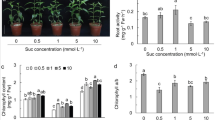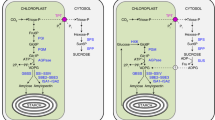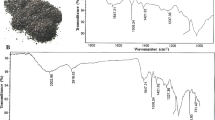Abstract
STUDIES in this laboratory have yielded evidence with both plants and animals that the conversion of D-glucose to L-ascorbic acid is by way of D-glucuronic acid and L-gulonic acid (or derivatives), and it seems that D-galactose may also pass to L-ascorbic acid through corresponding intermediates. The overall conversion of sugars (D-glucose, D-fructose and D-mannose) into L-ascorbic acid had, of course, been demonstrated previously, by Ray1 and others in plants, and by Jackel, Mosbach, Burns and King2 in animals.
This is a preview of subscription content, access via your institution
Access options
Subscribe to this journal
Receive 51 print issues and online access
$199.00 per year
only $3.90 per issue
Buy this article
- Purchase on Springer Link
- Instant access to full article PDF
Prices may be subject to local taxes which are calculated during checkout
Similar content being viewed by others
References
Ray, S. N., Biochem. J., 28, 996 (1934).
Jackel, S. S., Mosbach, E. H., Burns, J. J., and King, C. G., J. Biol. Chem., 186, 569 (1950).
Horowitz, H. H., Doerschuk, A. P., and King, C. G., J. Biol. Chem., 199, 193 (1952).
Author information
Authors and Affiliations
Rights and permissions
About this article
Cite this article
ISHERWOOD, F., CHEN, Y. & MAPSON, L. Synthesis of L-Ascorbic Acid in Plants and Animals. Nature 171, 348–349 (1953). https://doi.org/10.1038/171348a0
Issue Date:
DOI: https://doi.org/10.1038/171348a0
This article is cited by
-
Distinguish metabolic profiles and defense enzymes in Alternaria leaf blight resistant and susceptible genotypes of groundnut
Physiology and Molecular Biology of Plants (2019)
-
Predominant role of the l-galactose pathway in l-ascorbic acid biosynthesis in fruits and leaves of the Capsicum annuum L. chili pepper
Brazilian Journal of Botany (2016)
-
Production of D-Araboascorbic Acid by Penicillium
Nature (1960)
-
Das Vitamin C in Pflanze und Tier
Klinische Wochenschrift (1958)
Comments
By submitting a comment you agree to abide by our Terms and Community Guidelines. If you find something abusive or that does not comply with our terms or guidelines please flag it as inappropriate.



